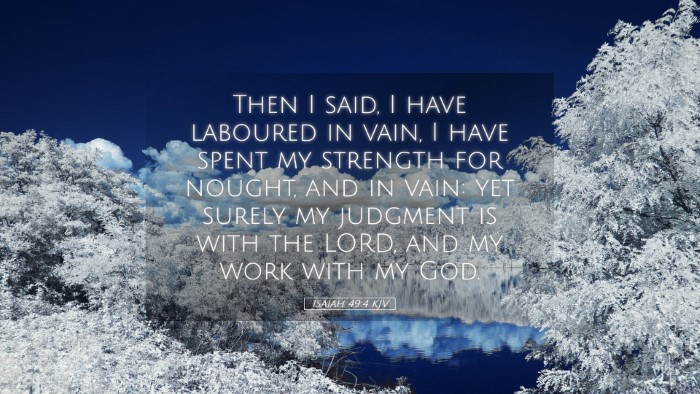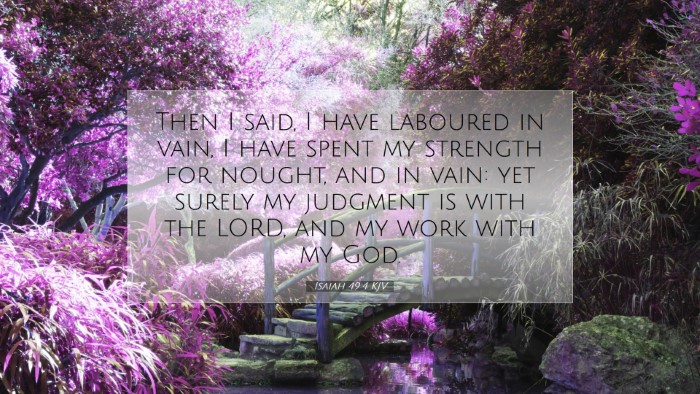Commentary on Isaiah 49:4
Isaiah 49:4 reads: "But I said, I have labored in vain, I have spent my strength for naught, and in vain: yet surely my judgment is with the Lord, and my work with my God." This verse is part of the Servant Songs, reflecting the inner turmoil and struggle of the Servant of the Lord amidst the challenges and apparent failures of his mission.
Overview of the Context
Isaiah 49 speaks of God's chosen servant who is called to restore Israel and be a light to the Gentiles. Despite the exalted purpose, we find a moment of despair where the servant questions the effectiveness of his endeavors. This moment resonates with many who labor in ministry, highlighting both the struggle and the hope inherent in God's promises.
Insights from Matthew Henry
Matthew Henry comments on the deep discouragement expressed by the servant. He observes that the servant feels his labor is in vain, reflecting a common human experience of being overwhelmed by apparent futility in the face of opposition or lack of results.
- Human Feelings: Henry notes that this feeling is not only normal but also a point of connection with Christ, who faced temptations and trials.
- God’s Assurance: Despite the servant's doubts, Henry emphasizes that God's ultimate purpose prevails, and the servant's labor is seen and valued by God.
Insights from Albert Barnes
Albert Barnes expands on the servant's expression of futility. He suggests that it indicates the depths of despair and disappointment that can accompany spiritual and ministerial pursuits.
- Frustration in Ministry: Barnes identifies that feeling one’s work is unproductive is widespread among those fulfilling divine calls.
- Divine Assurance: Barnes underscores that the acknowledgment of vain labor is followed by an important realization; there remains a divine evaluation and purpose behind the servant’s work.
Insights from Adam Clarke
Adam Clarke provides a theological perspective on the verse, noting that it speaks both to the collective experience of Israel and to Christ, who ultimately fulfills this passage.
- Collective and Individual Experience: Clarke points out that this labor is reflective of the struggles of the Jewish people in their exile and the loneliness of the servant who feels abandoned.
- Perspective Shift: Clarke highlights the servant's turn to God with hope, indicating that even in moments of doubt, one should recognize the steadfastness of God’s covenant promises.
Theological Implications
The verse encapsulates a profound theological truth about the nature of ministry and the divine calling. It addresses both the temporal feelings of futility and the eternal significance of faithfulness in labor. The servant's lament becomes a form of prayer, and the response of God illustrates His divine sovereignty and the assurance of His promises.
Application for Pastors and Theologians
This verse serves as a reminder for pastors and theologians that the path of ministry may often seem arduous and fruitless. However, it calls for a response rooted in faith and trust that God is at work, even when immediate results are not apparent.
Encouragement in Ministry
The struggles expressed in Isaiah 49:4 should encourage leaders in ministry to remain steadfast, realizing that God evaluates the heart and intention behind their labor, promising ultimately to bring forth fruit in His time.
Hope in Despair
The transition from despair to hope in this verse encourages those who face discouragement in their missions. It serves as a comfort that, while one’s view may be narrow and focused on immediate results, God’s view encompasses the broader picture of redemptive history.
Conclusion
Isaiah 49:4 encapsulates a deep human experience of laboring in God’s purpose while feeling the weight of apparent failure. Through the reflections from Matthew Henry, Albert Barnes, and Adam Clarke, it is evident that while the struggle may be real, God’s judgment and purpose remain true and steadfast. This encourages all who labor in the Lord’s vineyards to hold onto the promise that their work is seen, valued, and utilized in God's divine plans, ultimately bringing hope to the hopeless and light to the nations.


